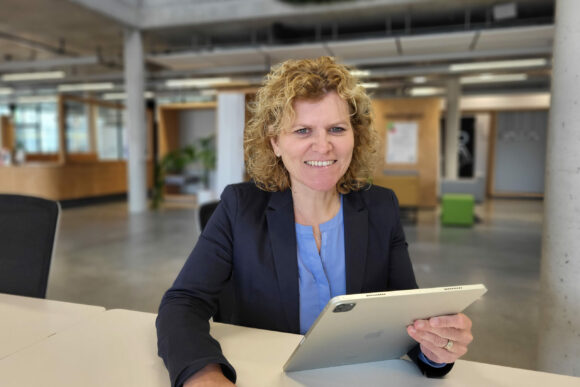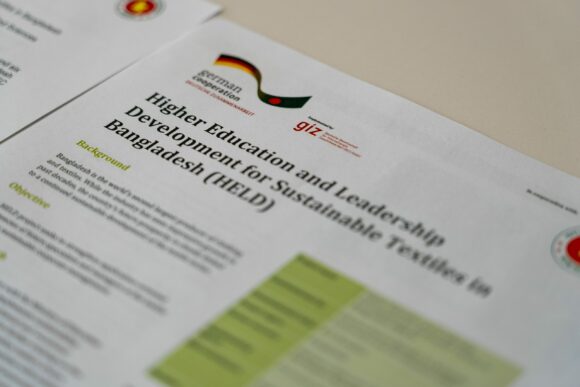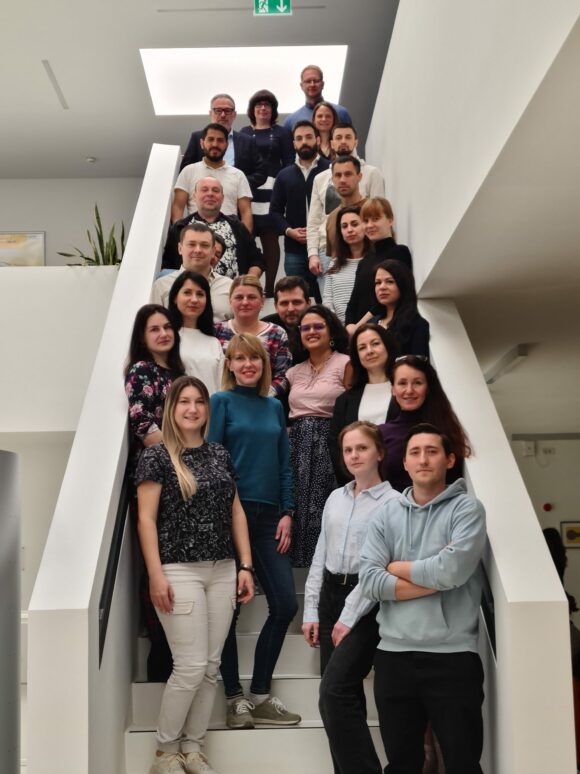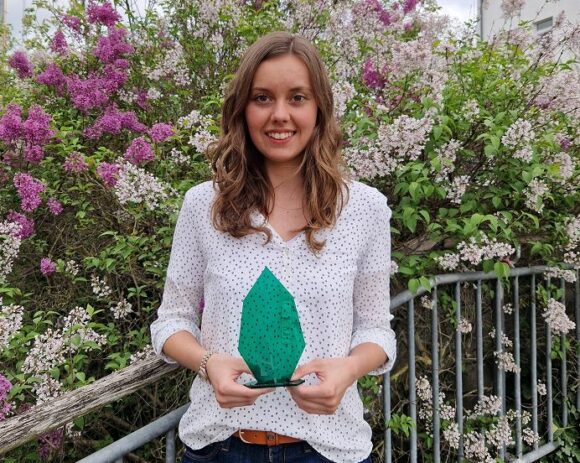On the occasion of the anniversary “125 years of the Königlich Höhere Webschule Münchberg”, in the third part of our series we once again take a look at the present day and shed light on the study opportunities at this university location.
Today, the Münchberg campus offers an education that is unique in Germany thanks to textile, textile technology and design courses that are closely interlinked with industry. The Institute for Material Sciences (ifm) is located here. In addition, the Fraunhofer Application Center for Textile Fiber Ceramics TFK is located at the Münchberg campus and develops new applications for the aerospace and automotive industries, among others. The technical center, which will be inaugurated in 2020, focuses on textile technology and air conditioning and builds a bridge from the region’s industrial tradition to research of the present and future.

Münchberg campus – facts and figures
- Students: Approximately 250, including about 95 international students
- Study programs: 4 in textiles and design
- Facilities: Cafeteria, university library, high-tech laboratories, machine hall, textile technical center and state testing office
- Institute for Material Sciences (ifm)
- Fraunhofer Application Center for Textile Fiber Ceramics (TFK)

Our study programs at the Münchberg Campus
Textile study programs
The university offers a sound engineering education at the Münchberg campus with the international Bachelor’s degree in Innovative Textiles and the Master’s degree in Sustainable Textiles, which also builds on this degree in English and deals with the challenges of the global textile industry, such as responsible production and environmental protection, but also legal regulations and labor rights.
Innovative Textiles (B.Eng.)
The know-how of this degree program lays the foundation for mastering material technology challenges such as process optimization in the production and finishing of textiles, taking into account technical, economic and ecological aspects.
Today, the term “textiles” is no longer just synonymous with apparel fabrics. Due to the enormous progress in development, the field of textiles has become one of the high-tech sectors of global industry in recent years. Their versatile functionalities have made these innovative materials indispensable for technical applications in industries ranging from automotive to aerospace.
The bachelor’s degree program in Innovative Textiles provides students with in-depth knowledge of innovative materials science (fibers, yarns, knitted fabrics, woven and non-woven fabrics, finishing chemicals) and modern processing technology (surface technology, finishing). The program is practice-oriented and offers students the opportunity to work on projects with companies in the textile industry. This allows them to put their knowledge and skills directly into practice and gain valuable experience.
After graduation, graduates have excellent career opportunities in the textile industry, in research and development or in consulting. They are able to develop and produce innovative textiles that meet the requirements of modern society and contribute to sustainability.

Sustainable Textiles (M.Eng.)
In the Sustainable Textiles master’s program, students acquire in-depth knowledge of the challenges facing today’s global textile industry. The focus is on the quality of renewable and petrochemical materials, responsible production and environmental sustainability, legal regulations and labor rights, and creating transparency in the complex global value chain to shape the textile industry of the future.
During their studies, students acquire the necessary skills to develop (more sustainable) processes in textile chemistry, optimize production processes and research innovative fibers and finishes.
Graduates have excellent career opportunities in Germany and abroad, and their master’s degree qualifies them for a variety of interesting positions in the global textile value chain or to obtain a doctorate.
In the textile sector, Hof University of Applied Sciences and its Münchberg campus have earned an excellent international reputation. Münchberg lecturers, graduates and students are sought-after discussion partners and contacts when it comes to developing classic textile production towards sustainable and ecological production, for example in Bangladesh.
Design courses
Communication Design (B.A.)
The working world of communication designers is changing faster today than in the past: classic fields of work are disappearing and new ones are emerging. The continuous development and reorientation of communication design studies at the Münchberg campus takes this phenomenon into account in order to prepare students for a variety of problems and lifelong learning.
In the course with the most students at the Münchberg Campus, the bachelor’s degree in Communication Design, students develop forms of conveying and presenting information – with the aim of making it easier for people to recognize, inform and orient themselves in a globalized world.

The students deal openly with traditional and innovative techniques, using analog and digital tools according to the implementation ideas. During the work process, the focus is on research and experimentation.
The interest in socially relevant topics and their staging as well as the willingness to deal with the latest media technology is a basic requirement for studies and later professional life.
Excursions to agencies, companies and production sites expand the content of the practice-oriented teaching. Students learn how different design disciplines – graphic design, information design, user experience, editorial, animation and interaction – are applied in working life. In recent years, students have visited art+com, Infographics Group and Gestalten Verlag, among others. This is where the first contacts are made for the practical semester.
After graduation, graduates of the Bachelor of Communication Design work, for example, in well-known companies such as BMW, SAP or Siemens, in large agencies such as IBM IX, in research or dare to take the step into self-employment.
Textile Design (B.A.)
Textile Design at the Münchberg Campus means more than just creativity and aesthetic competence. Rather, the educational goal is to enable students to plan and develop good design while making optimal use of production and economic factors.
During the bachelor’s program, students learn basic design processes, the use of colors, shapes, surfaces and materials, the design of textile surfaces and application of textile technologies, computer-aided design techniques, theoretical principles and an interdisciplinary understanding of design. Through the selection of modules and projects, focal points can be set, such as a combination of fashion, product and textile design. Personal supervision in small groups and comprehensive, technical equipment at the university provide the ideal environment for developing individual skills. A combination of experimental and practical work is the reason for the reputation of the Münchberg textile design program. The students benefit from a network of renowned cooperation partners from the industry to the manufactory.

The later professional field includes the classic areas of clothing, home and contract textiles, as well as increasingly the technical area such as vehicle construction, protective clothing and sports textiles. In addition, textile designers are employed in all areas of surface and color design, such as in the paper and wallpaper industry, but also in architecture and interior design.
Once a semester, the communication design and textile design programs invite interested parties to an exhibition of their work. During the exhibition, the students present selected innovative semester works to the visitors and the guests can take a look behind the scenes of modern design studies at the Münchberg campus. Next date is Friday, 07.07.2023. The summer work show will open at 16.00.
Detailed info about the study opportunities at Hof University of Applied Sciences at the Münchberg Campus and its other locations can be found here…
They are the present – today’s students as well as study program leaders at the Münchberg Campus
Picture 1: Study course Innovative Textiles; Picture 2: Study course Sustainable Textiles; Picture 3: Study course Textile Design; Picture 4: Study course Communication Design











